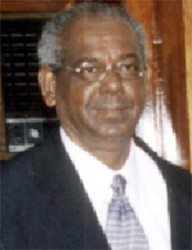Guyana is closer than ever to solving the riddle of political instability with constitutional reform also inevitable, former Speaker of the National Assembly Ralph Ramkarran says.
“If no political party gains an absolute majority of the votes at the upcoming elections, as many speculate can again happen, a coalition government comprising at least two parties is likely to emerge. A denial at a top place on the political agenda for a political solution (for the distribution of political power) could not then be sustained,” Ramkarran wrote in his column in the Sunday Stabroek yesterday. “Constitutional reform would follow,” he added.
The AFC has been clamouring for constitutional reform and at the party’s recent conference, its chairman Nigel Hughes outlined some proposals. Ramkarran said that the proposals suggests that the structure of Guyana’s executive and legislature, and the relationship between them, need to be altered. He noted that the proposals add to those already in circulation, offered by other persons while there is also substantial writing and academic material on record on situations like Guyana’s. “This debate will gather steam and climb to the top of the agenda only when the political conditions mature,” he said.

Ramkarran recalled that in response to the AFC’s proposals, General Secre-tary of the PPP Clement Rohee, said that Guyana’s constitution, which was amended in a reform process between 1999-2001, is the most advanced in the Caribbean Region. “This rejection of constitutional reform demonstrates the absence of the political consensus which is necessary to drive such a process,” he observed.
According to Ramkarran, a constitution needs to be changed when some or all of its rules no longer reflect the popular will or when they have been overtaken after the effluxion of time. “Suggestions for reform of the constitution, therefore, reflect a view that it is in need of restructuring,” he said.
The former PPP stalwart observed that Guyana has an undeniable political problem, which is rooted in the existence of two large ethnic groups that have been placed in competition by economic, social and political arrangements as they developed historically and as they exist today. “This competition, which has expressed itself in communal friction of varying degrees, finds political expression in two large political parties competing for political power. Although both the PPP and the PNC have officially declined to acknowledge this situation, they have given implied recognition of it and have offered solutions,” he said.
However, he pointed out that there were several setbacks to the process of establishing a political solution. “These were the rejection of the National Patriotic Front by the PNC, failure to reach a political consensus for the 1992 general elections, the majoritarian impulse of the PPP after the 1992 elections and the passing of Cheddi Jagan in 1997,” he said.
Sealed
“The ascension of Mrs Janet Jagan to the presidency in 1997, sealed the abandonment of winner does not take all, even by those who had vigorously supported it in the past. Mrs Jagan had always adamantly rejected all such approaches, notwithstanding that they were longstanding party policies, which have never been formally rejected. Desmond Hoyte’s bitter, implacable and sterile political hostility to the PPP Government from 1992 onwards, dampened any residual ardour within the PPP for winner does not take all,” he added.
Ramkarran asserted that the primary obstacle, therefore, is not the constitution. “It is the existence of a political problem regarding the distribution of political power. The de jure distribution is solved technically by general elections. But their outcome leaves the bitter taste of ethnic winners and losers, victors and vanquished. In its present day configuration, the PPP is yet to acknowledge this state of affairs. With Cheddi Jagan at its helm, it did in 1978,” he said.
It was in this context that he remarked that Guyana is closer than ever to solving the riddle of political instability.
“Our main political parties are blissfully unaware of how in a few important respects some of their approaches are similar. The PNC when in office declared that the race problem had been solved. At the last elections the PPP quietly predicted that it would obtain 60 per cent of the vote, reflecting the same mindset. When in office the PNC rejected any form of coalition with the PPP. Now in office, even in a minority, the PPP rejects any form of coalition with APNU. The persistence of this attitude by the PPP after the upcoming elections, if it gains a majority, will cause that party to temporarily deny the burning desire of Guyanese people, including its own supporters, for a political solution. But it cannot postpone the inevitable indefinitely,” he said.
“Our political process has been painfully slow. This has resulted from the split of the PPP in 1955 and the striving for political dominance since that time. In 1978 the PPP rejected the policy of political dominance. It declared that it did not want to dominate or be dominated. The reality of the PPP’s grip on political power since 1992 has put on hold this and all the other admirable ideals of a political solution that it developed while in opposition. Now that its power to dominate is waning, hopefully these ideals will rise to the surface once again,” Ramkarran wrote.









